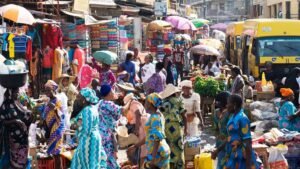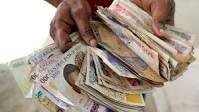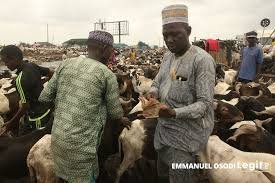Juliet Jacob and Rabiu Sultan Aderinsola went to the streets in Abuja and captured the mood of Muslim faithful celebrating the recent Eid-el-Fitr. Some shared how they coped with the current economic hardship in the country.
As millions of Muslims across Nigeria marked the 2025 Eid-el-Fitr celebrations, the usual joy, color, and communal exuberance that characterize the festive period were noticeably subdued. A convergence of harsh economic realities—soaring food and fuel prices, worsening transportation costs, and persistent insecurity—dampened the spirit of Salah, forcing many to forgo long-standing traditions and cut down drastically on celebrations.
Bleak Festive Spirit Amid Soaring Costs

Wuse Market, Abuja
From Lagos to Kano and the Federal Capital Territory, the festive mood was overshadowed by anxiety over rising inflation and dwindling incomes. A report by Prime Business Africa revealed that many Nigerians prioritized survival over celebration, a sharp departure from the normally vibrant Salah atmosphere.
Staggering Economic Indicators
According to the National Bureau of Statistics (NBS), Nigeria’s inflation has remained high. Headline inflation peaked at 34.80% in December 2024, before easing to 23.18% in February 2025. Food inflation—arguably the most pressing issue for Nigerian households—was 39.93% in November 2024 and only declined marginally after a rebasing exercise, settling at 26.08% in January 2025.

A joint report by the Food and Agriculture Organisation (FAO) and partners projected that 33.1 million Nigerians will face acute food insecurity in 2025. The factors fueling this crisis include inflation, climate-related disruptions, and insecurity in farming regions.
Patricia Omorue, a food grain trader at the Dutse Alhaji Monday Market, told African Health Reports (AHR) that despite a slight drop in the prices of some food items in recent months, sales remained low.
“Although prices of some food items have gone down a bit over the past few months, we still didn’t see an increase in sales during this year’s Sallah,” she lamented.
In previous years, Khadijat, a resident of Isolo, Lagos, would have marked the festive season with generous gifts and elaborate celebrations for her community. This time, however, she could only manage a few cartons of soft drinks a modest gesture that reflects the deepening economic strain many Nigerians now face.
Low Turnout for Prayers and Celebrations in the North
Across several parts of northern Nigeria, this year’s Eid celebrations were marked by an unusual stillness. Instead of the familiar sight of jubilant crowds in colorful attire streaming toward prayer grounds, many communities witnessed a subdued morning. The soaring cost of fuel kept countless Muslim faithful at home, unable to afford transportation to partake in the communal Eid prayers—a stark reminder of how deep the economic hardship has cut into even the most cherished religious traditions.
The third consecutive suspension of Kano’s iconic Eid Durbar festival cast a long shadow over the city’s cultural identity, dampening the festive spirit that usually unites residents and visitors alike. Beyond the missed celebrations, the absence of the centuries-old tradition has disrupted a vital economic lifeline—stalling income for traders, hoteliers, and artisans who rely heavily on the annual spectacle to sustain their businesses.
“Business has taken a serious hit,” said Lola Habenee, a fashion entrepreneur. “Sallah used to bring in the highest sales of the year, but this time around, it was a struggle. My loyal clients barely ordered anything fancy — just the bare minimum. I’ve even scaled down my inventory to avoid losing money.”
Everyday Voices, Everyday Struggles
For many like Umar Pharouq, a corps member based in Abuja, the celebration was a far cry from what he had known growing up.
“You see, chicken that used to cost ₦5,000 now sells for ₦15,000 to ₦20,000. Even clothes and caps have doubled or tripled in price. Transport too Abuja trips that were ₦6,000 are now ₦10,000 or more. I didn’t buy anything this year. I just managed what I had.”
In the Dutse Alhaji area of Abuja, Baba Hussaini, a young Muslim man, shared with Africa Health Report that he remained behind while his father and younger brother went on their trip for Salah.
“My dad couldn’t afford transport for all of us. I didn’t enjoy this Salah at all because of the economic crisis,” he said.
Faith, Resilience, and Communal Spirit
Despite the grim economic outlook, some Nigerians found ways to uphold the spirit of Eid. In several communities, residents organized communal prayers and meals, sharing what little they had.
Rasaq Ibrahim, a member of a mosque in Lagos, shared his thoughts on this year’s Sallah celebration:
“This year’s Sallah should have been a time of gratitude and generosity, but instead, it felt more like a season of hardship than joy. Many who were once able to give are now facing struggles of their own. Nevertheless, the spirit of the celebration remained strong, with people doing their best to make the most of what little they had.”
UniAbuja student Fatima Zahara echoed this sentiment, describing how economic hardship had reshaped the celebration, but not the sense of unity.
“This year’s Eid celebrations have been significantly impacted. Many Muslims couldn’t celebrate with the same enthusiasm, but it has brought people closer in different ways
Conclusion: Celebrating Through Crisis
This year’s low-key Eid-el-Fitr in Nigeria is a mirror of the country’s wider economic and social challenges. As inflation, insecurity, and poverty converge to create a storm of hardship, Nigerians continue to exhibit remarkable resilience.
While the grandeur of the Salah celebration was missing, the enduring values of faith, compassion, and community shone through in small but meaningful ways reminding the nation that in times of hardship, unity and hope are more vital than ever.



